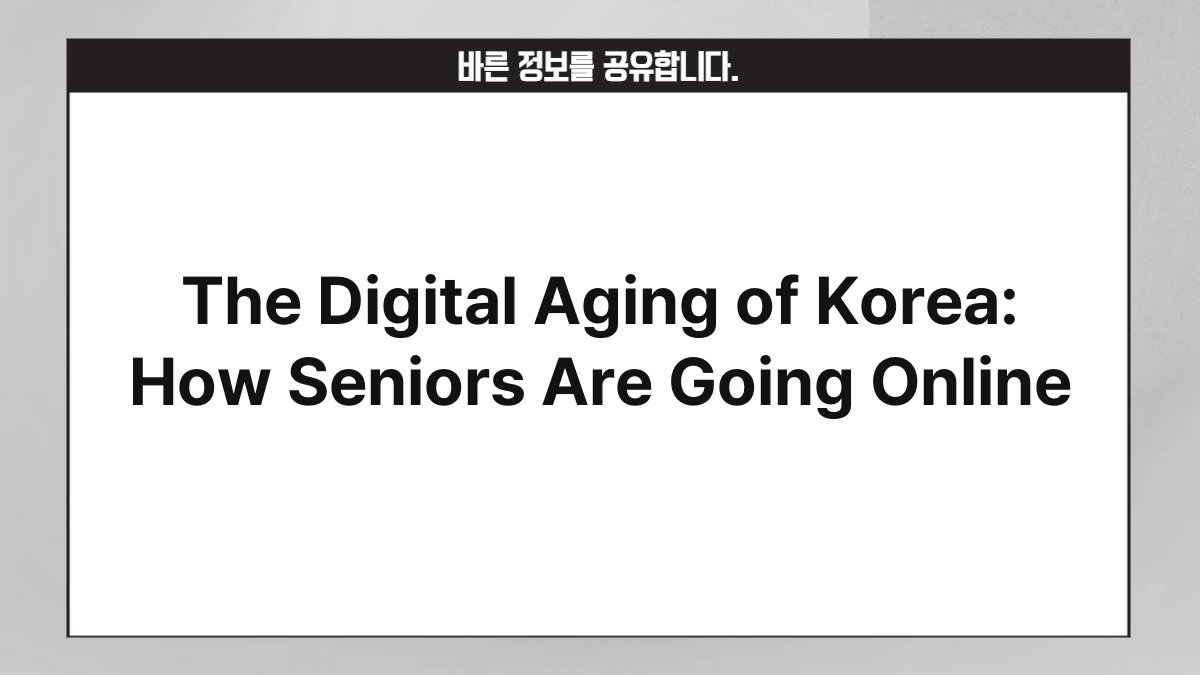[K-Bridge/Samuel] The Digital Aging of Korea: How Seniors Are Going Online explores the increasing presence of senior citizens in the digital landscape of Korea.
As technology continues to evolve, older adults are embracing the internet, utilizing various platforms for communication, entertainment, and information.
This shift not only enhances their quality of life but also helps bridge the generational gap, fostering connections with younger family members.
Understanding this phenomenon reveals the challenges and benefits faced by seniors in navigating the digital world, as well as the societal implications of their online engagement.
By reading this article, you will gain insights into the trends, challenges, and opportunities associated with the digital aging of Korea.
The Rise of Digital Engagement Among Seniors
Understanding the Shift in Behavior
The rise of digital engagement among seniors in Korea is a significant trend that reflects broader societal changes.
As technology becomes more integrated into daily life, older adults are increasingly recognizing the benefits of being online.
Access to information, communication tools, and entertainment options has transformed how seniors interact with the world around them.
This shift is not only about adapting to new technologies but also about enhancing their social lives and staying connected with family and friends.
The digital realm offers a sense of independence and empowerment that many seniors find appealing.
Moreover, the pandemic has accelerated this trend, as more seniors have turned to digital platforms for social interaction and essential services.
Virtual gatherings, online shopping, and telemedicine have become lifelines for many, showcasing the adaptability of this demographic.
This newfound digital engagement has led to a greater sense of community among seniors, who often share tips and experiences about navigating online spaces.
Understanding this shift is crucial for addressing the needs and preferences of an aging population in a rapidly changing digital landscape.
The Role of Education and Training
Education and training play a pivotal role in fostering digital engagement among seniors.
Many older adults may feel intimidated by technology, leading to a reluctance to embrace online platforms.
However, community programs and workshops aimed at teaching digital skills have emerged as vital resources.
These initiatives provide seniors with the necessary tools to navigate the internet confidently, from basic computer skills to advanced social media usage.
By demystifying technology, these programs empower seniors to explore the digital world without fear.
Additionally, family members can play a significant role in facilitating this learning process.
Encouraging patience and understanding, younger generations can guide seniors through the intricacies of digital engagement.
This intergenerational support not only enhances seniors’ digital literacy but also strengthens family bonds.
As seniors become more adept at using technology, they can engage more fully with their families and communities, fostering a sense of belonging and connection.
Bridging the Generational Gap
The digital aging of Korea is also contributing to the bridging of generational gaps.
As seniors become more active online, they find themselves better equipped to engage with younger family members who are often immersed in digital culture.
This shared experience can lead to deeper connections and more meaningful interactions.
For instance, grandparents who learn to use social media can share their lives and interests with their grandchildren, creating a platform for dialogue and understanding.
Moreover, the digital space allows seniors to participate in contemporary cultural conversations, from trends in entertainment to discussions about social issues.
This engagement not only enriches their lives but also allows them to contribute their perspectives, fostering mutual respect between generations.
As the digital divide narrows, the potential for collaboration and shared experiences increases, ultimately benefiting society as a whole.
Challenges Faced by Seniors in the Digital World
Technological Barriers
Despite the growing digital engagement among seniors, significant challenges remain.
One of the primary obstacles is the technological barrier, which can be daunting for many older adults.
Complicated interfaces, frequent updates, and the rapid pace of technological change can lead to frustration and disengagement.
Many seniors may struggle with learning new devices or applications, which can discourage them from exploring the digital world further.
To address these challenges, it is essential to create user-friendly platforms tailored to the needs of seniors.
Simplifying interfaces and providing clear instructions can make a significant difference in their online experiences.
Additionally, ongoing support and resources should be readily available to assist seniors in overcoming these barriers.
By fostering an environment that prioritizes accessibility, we can encourage more seniors to embrace technology confidently.
Privacy and Security Concerns
Privacy and security concerns are another significant challenge for seniors navigating the digital landscape.
Many older adults may be unaware of the potential risks associated with online activities, such as identity theft or scams.
This lack of awareness can lead to vulnerability, making it crucial for education on digital safety to be a priority.
Seniors need to understand how to protect their personal information and recognize potential threats in the online world.
Community organizations and family members can play a vital role in providing guidance on safe online practices.
Workshops focusing on cybersecurity and privacy can empower seniors to take control of their online presence.
By fostering a culture of awareness and vigilance, we can help seniors enjoy the benefits of digital engagement while minimizing risks.
Social Isolation and Mental Health
While digital engagement can alleviate social isolation, it can also present challenges related to mental health.
Some seniors may feel overwhelmed by the digital world, leading to feelings of inadequacy or frustration.
This emotional response can deter them from fully engaging with online platforms, ultimately exacerbating feelings of loneliness.
Addressing mental health concerns is essential in promoting a positive digital experience for seniors.
Encouraging seniors to engage in online communities that share their interests can be beneficial.
These platforms can provide a sense of belonging and support, helping seniors connect with others who understand their experiences.
Additionally, promoting a balanced approach to technology use is crucial, ensuring that seniors do not rely solely on digital interactions for socialization.
By fostering a healthy relationship with technology, we can enhance the overall well-being of seniors in the digital age.
The Impact of Social Media on Seniors
Connecting with Family and Friends
Social media has emerged as a powerful tool for seniors, enabling them to connect with family and friends.
Platforms like Facebook and Instagram allow older adults to share their lives, photos, and experiences, fostering a sense of community.
These interactions can significantly enhance their social lives, as they can stay updated on family events and milestones, regardless of distance.
Moreover, social media provides a platform for seniors to express themselves creatively.
Many older adults find joy in sharing their hobbies, interests, and life stories online, contributing to a rich tapestry of shared experiences.
This not only boosts their self-esteem but also encourages meaningful interactions with others who share similar passions.
The ability to connect with loved ones and express themselves can have a profound impact on seniors’ emotional well-being.
Access to Information and Resources
The digital aging of Korea has also transformed how seniors access information and resources.
Social media platforms serve as valuable sources of news, health information, and community resources.
Seniors can join groups focused on specific interests or health conditions, gaining insights and support from peers who share similar experiences.
This access to information empowers seniors to make informed decisions about their lives and well-being.
Furthermore, social media can facilitate engagement with local communities.
Seniors can discover events, workshops, and activities happening in their area, encouraging participation and socialization.
This increased awareness of community resources can lead to a more active and fulfilling lifestyle, combating feelings of isolation and loneliness.
By harnessing the power of social media, seniors can enrich their lives and stay connected to the world around them.
Fostering Support Networks
Social media has the potential to foster support networks for seniors, providing a platform for sharing experiences and advice.
Many older adults find solace in connecting with others who face similar challenges, whether related to health, caregiving, or navigating the digital world.
These online communities can offer emotional support, practical tips, and a sense of belonging that is often lacking in traditional social interactions.
Additionally, support groups on social media can help seniors feel less isolated in their struggles.
By sharing their stories and experiences, they can create a sense of camaraderie and understanding among peers.
This social support can be instrumental in improving mental health and overall well-being, as seniors realize they are not alone in their challenges.
The power of social media to foster these connections is a vital aspect of the digital aging experience.
The Role of Technology in Enhancing Quality of Life
Telehealth Services
Telehealth services have revolutionized healthcare access for seniors, allowing them to receive medical attention from the comfort of their homes.
This is particularly beneficial for those with mobility issues or chronic health conditions.
By utilizing video calls and online consultations, seniors can connect with healthcare providers without the need for travel, reducing stress and enhancing their overall quality of life.
Moreover, telehealth services can facilitate timely interventions, preventing health issues from escalating.
Regular check-ins with healthcare professionals can help seniors manage their conditions more effectively, leading to improved health outcomes.
The convenience and accessibility of telehealth contribute to a more proactive approach to healthcare, empowering seniors to take charge of their health and well-being.
Online Learning Opportunities
The digital aging of Korea has opened up a world of online learning opportunities for seniors.
Many educational institutions and organizations offer courses tailored to older adults, covering various topics from technology skills to arts and crafts.
This access to lifelong learning enhances cognitive engagement and provides seniors with a sense of purpose and accomplishment.
Participating in online courses can also foster social connections, as seniors interact with fellow learners.
These interactions can lead to friendships and support networks, enriching their lives beyond the classroom.
The ability to learn and grow in a digital environment empowers seniors to remain active and engaged members of society, contributing to their overall happiness and fulfillment.
Entertainment and Leisure Activities
Technology has transformed how seniors engage in entertainment and leisure activities.
Streaming services, online games, and virtual events provide a plethora of options for seniors to enjoy their free time.
This access to diverse forms of entertainment can combat boredom and isolation, offering a sense of joy and relaxation.
Additionally, many seniors are discovering new hobbies through digital platforms, such as cooking, gardening, or crafting.
Online tutorials and communities provide resources and support for exploring these interests, enhancing their quality of life.
The ability to engage in enjoyable activities, whether alone or with others, is vital for maintaining mental and emotional well-being in the digital age.
The Future of Digital Aging in Korea
Evolving Technologies
As technology continues to evolve, the future of digital aging in Korea holds promising possibilities.
Innovations such as artificial intelligence, virtual reality, and smart home devices are poised to enhance the lives of seniors further.
These advancements can provide tailored solutions for health monitoring, social engagement, and daily living, making technology more accessible and beneficial for older adults.
For instance, smart home technologies can assist seniors in maintaining their independence by automating tasks and ensuring safety.
Virtual reality can offer immersive experiences, allowing seniors to explore new places or participate in activities they may not be able to do physically.
Embracing these evolving technologies will be crucial in supporting seniors’ digital engagement and overall well-being.
Policy and Community Support
The future of digital aging in Korea also depends on supportive policies and community initiatives.
Government programs aimed at promoting digital literacy among seniors can help bridge the technological gap.
Investing in resources and training for older adults will ensure they can fully participate in the digital world, enhancing their quality of life.
Community organizations can play a vital role in facilitating this transition by offering workshops, resources, and support networks.
By fostering an inclusive environment that prioritizes seniors’ digital engagement, we can create a society that values and supports its aging population.
Collaborative efforts between government, community organizations, and families will be essential in shaping a positive future for digital aging in Korea.
Intergenerational Collaboration
The future of digital aging in Korea will also benefit from intergenerational collaboration.
Encouraging younger generations to engage with seniors in the digital space can foster mutual understanding and support.
Initiatives that promote intergenerational learning, such as tech mentorship programs, can empower seniors while providing valuable experiences for younger individuals.
These collaborations can lead to a more cohesive society, where the wisdom of older adults is respected and valued.
By bridging the gap between generations, we can create a culture that embraces the contributions of all age groups, enhancing the overall quality of life for seniors in the digital age.
In conclusion, the digital aging of Korea represents a profound shift in how seniors engage with technology and the world around them.
As they navigate the digital landscape, they face both challenges and opportunities that can significantly impact their quality of life.
By understanding these dynamics and fostering supportive environments, we can empower seniors to thrive in the digital age, enriching their lives and strengthening societal connections.








